Free School For Farmworkers

Free School For Farmworkers
Free School for Farmworkers is community education for farmworkers. Inspired by the power of connection and by anarchist free schools located all over the world, Free School seeks to connect workers for knowledge sharing and skill building through online sessions and occasional in-person educational retreats. All Free School teach-in topics come from needs and requests posed by farmworkers, and all are simultaneously interpreted into Spanish by Cooperativa Brújulas. If you’re a farmworker and have a future teach-in topic in mind, please click the button below to access the form.
Free School is a collaborative project between the University of Wisconsin-Madison Extension Dane County, Not Our Farm, and FairShare CSA Coalition. These sessions are for farmers who work on farms they do not own. If you would like to request a recording of any of the sessions below, please contact Sarah Janes Ugoretz.
- March 9: Growing Medicinal Herbs
- March 31: Labor-Movement Encore
- April: Solidarity with Tribal Food Sovereignty
- June 14: Save the Date for our first in-person Free School Retreat at Fox Haven Farm in Jefferson, MD!
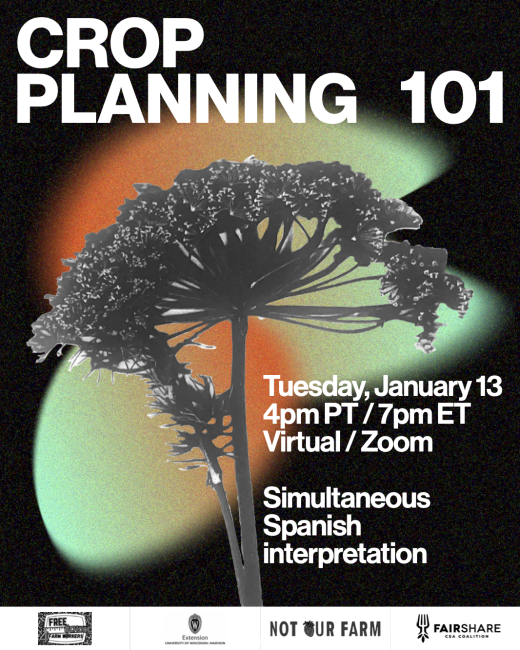
Crop Planning 101
Crop planning is to farming what training is to marathon runners: on race day, it’s not necessarily seen, but it’s what gets you to the finish line without running out of steam (or crops!). At this teach in, Maia Lipkin and Sean Mooney from Mountain Bounty Farm shared the ins-and-outs of crop planning for the farm’s CSA program. We also learned from Federica Ranelli at Rooted-Troy Farm, who spoke about crop planning with community in mind and intentionally centering cultural relevance in these efforts.
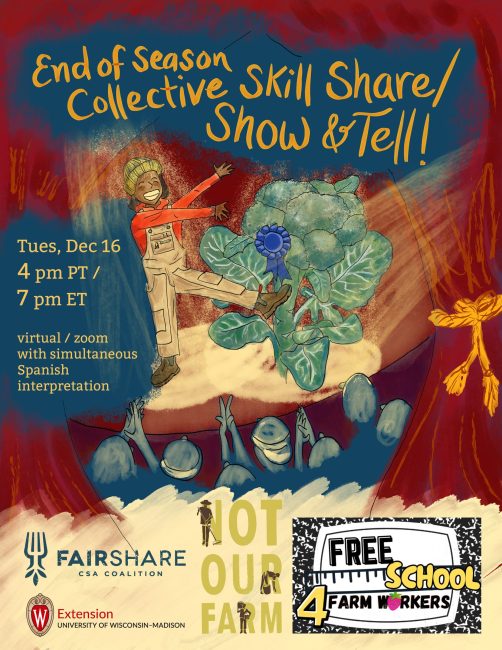
End of Season Show-and-Tell
At our first-annual celebratory Show-and-Tell session, farmworkers from across the country showcased their skills and talents. The line-up included workers teaching one another about corn braiding, heirloom garlic growing (including how to do garlic math!), agroecological pedagogy for children, persevering pine and crafting pine soda and syrup, seed saving and processing, vermicomposting relay races, farm tasks as games, and using gathas (poems/verses) with farm tasks.
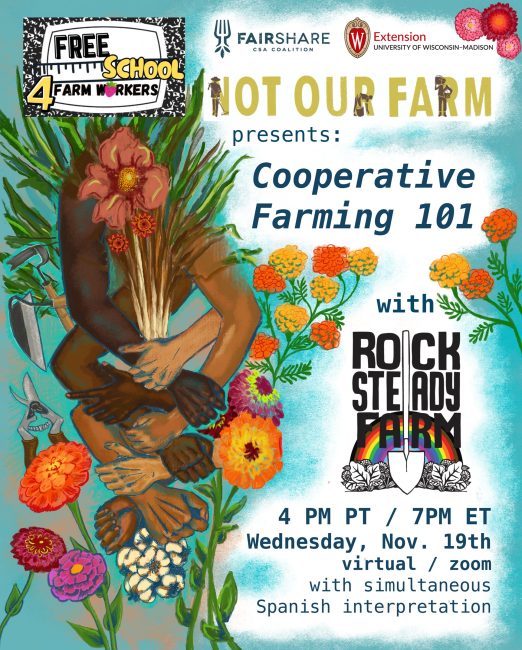
Cooperative Farming 101
At this teach-in, D and Maggie shared their 10 years of experience as founders and stewards of worker-owned Rock Steady Farm in upstate NY. Using Rock Steady as a case study and just one example of a worker cooperative, they shared their “whys”, the farm’s coop values, talked about work culture, and got real about the hard stuff.
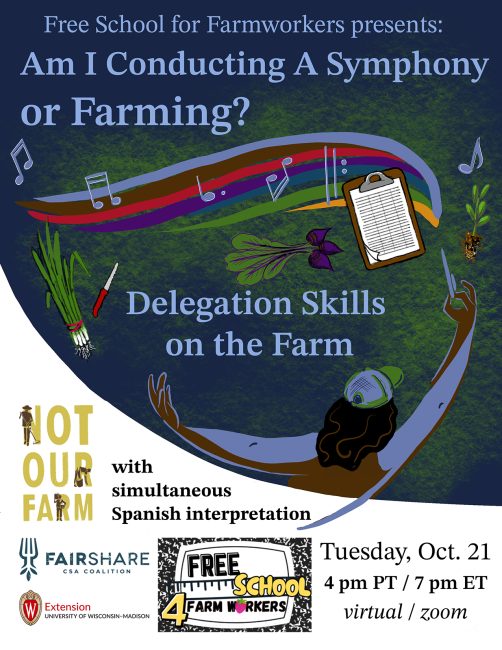
Delegation Skills on the Farm
Delegating as a manager is crucial for any farm’s success, not to mention crew satisfaction. But it can be tricky – knowing how long a task will take, making sure no one is stuck with the same monotonous job every time, balancing power dynamics, building skills among the crew while also trying to be motivating. Delegation is the true unsung hero of a happy farm. In this session, seasoned farm managers Sarah Bell and Abby Benson shared their delegation tips and tricks while also inviting a lot of experience and knowledge from attendees.
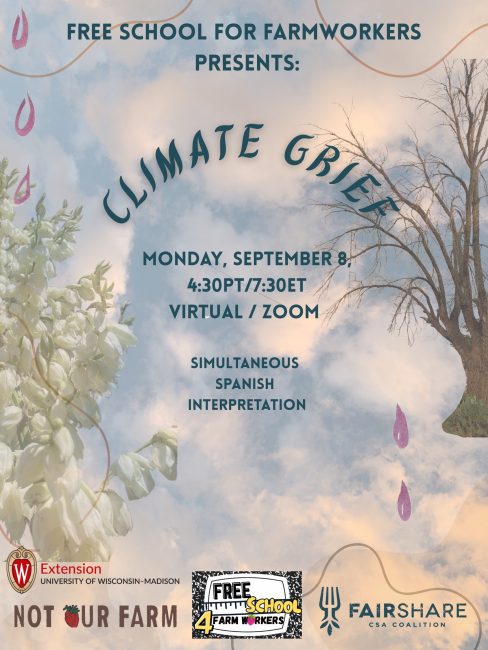
Climate Grief
Climate grief, eco-grief, eco-anxiety, solastalgia. There is growing language and vocabulary to describe the experience of being part of a rapidly changing planet, and the sense of loss that arises from witnessing and anticipating this change. Facilitated by mai cortez doan, this workshop offered space for writing and personal reflection, sharing, and guided practice for being with climate grief and turning to the natural world in ways that grow our capacity to navigate ecological loss and change, with support and connection, with reciprocity and care.
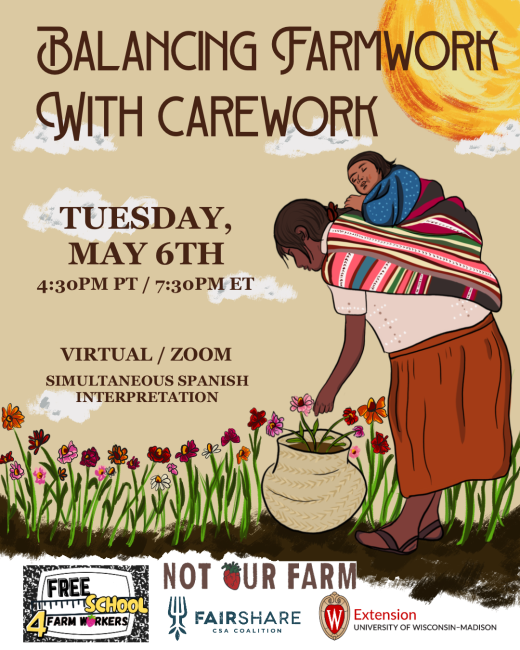
Balancing Farmwork with Carework
Carework is something that almost all of us participate in, in one form or another, at different points in our lives. It is necessary and unrelenting work that can go unpaid and unseen by society. At this teach-in, Laura Fredrickson-Gosewisch – farmer, bodyworker and farmer mental health advocate – explored farmworkers strategies for providing care while performing farm work. Discussion extended to examining balance as a practice rather than a state of being. Farmworkers Mayam Garris, Ona Magee, and Daisy Cortes shared their own experiences at the intersection of farmwork and carework.
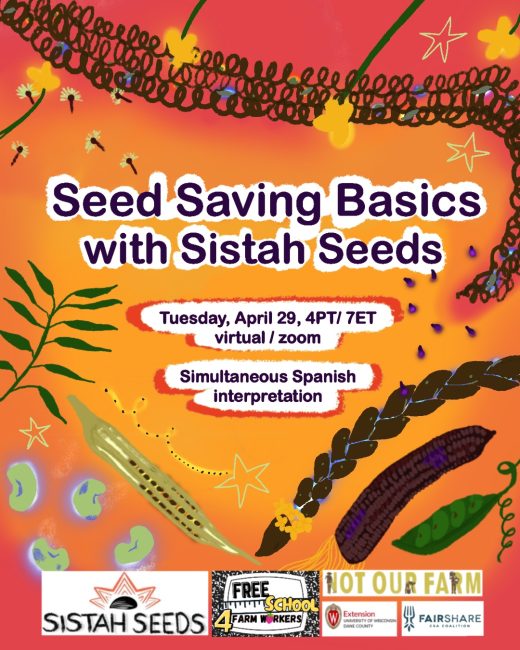
Seed Saving Basics with Sistah Seeds
When you grow a crop to seed, you get to witness its entire life cycle and the legacy it leaves. The connection is powerful. Yet within production farming – especially under capitalism – many farmworkers do not have the option to save seeds and take part in this process. At this teach-in, Amirah Mitchell of Sistah Seeds led attendees through the basics of plant botany, explained characteristics and considerations across seed types (like wet seeds versus dry seeds), and discussed how to incorporate seed saving into the growing season. We also heard from farmworkers Alé Lomanto and Tiana Suazo, who are saving and rematriating seeds on land with insecure tenure.
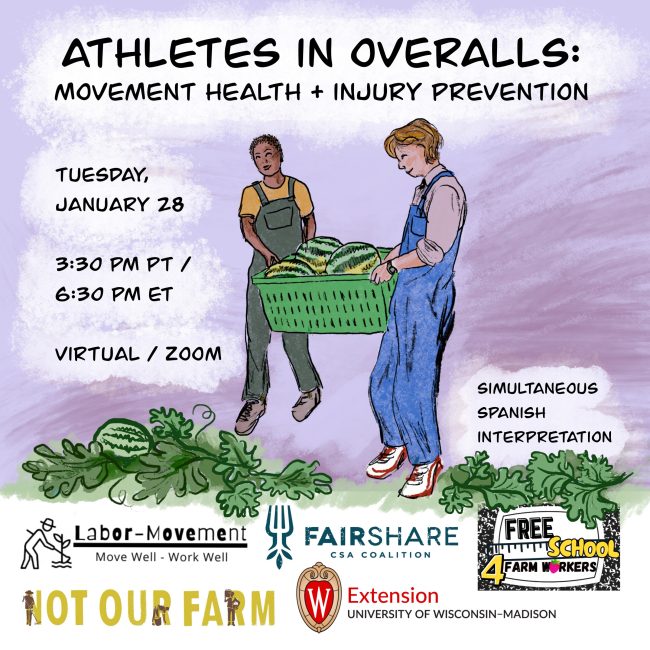
Athletes in Overalls: Movement Health and Injury Prevention with Labor-Movement
When we look at farmwork through the lens of sport and athleticism, what changes? How does that impact farmworkers’ diets, attention to their bodies, sleep hygiene, and confidence around advocating for needs? At this teach-in, Cynthia Flores – longtime farmer, strength athlete, personal trainer and leader of Labor-Movement – hosted a discussion and skillshare on movement health and injury prevention from an athletic perspective. Attendees learned about managing food, fluid, sleep, and stress over long days. Discussion also included safe lifts using hinges and squats, tips for reducing the potential of lower back pain, and techniques for moving and carrying loads.
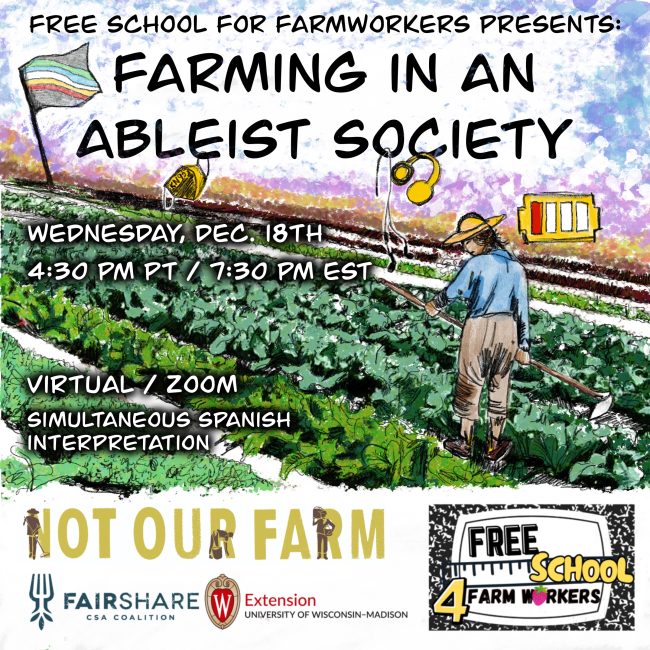
Farming in an Ableist Society
Farming demands a lot of the bodies that do this work. But what if some of those demands aren’t physically possible? This Free School teach-in was grounded in the understanding that it’s the environment we build that creates a physically and socially inaccessible space. The problem is not the person who has a disability. Accessibility and inclusion consultant Kristie Cabrera led this discussion, exploring strategies for self-management, how to care for fellow crew members navigating accessibility issues, and ways to support disability justice on farms.
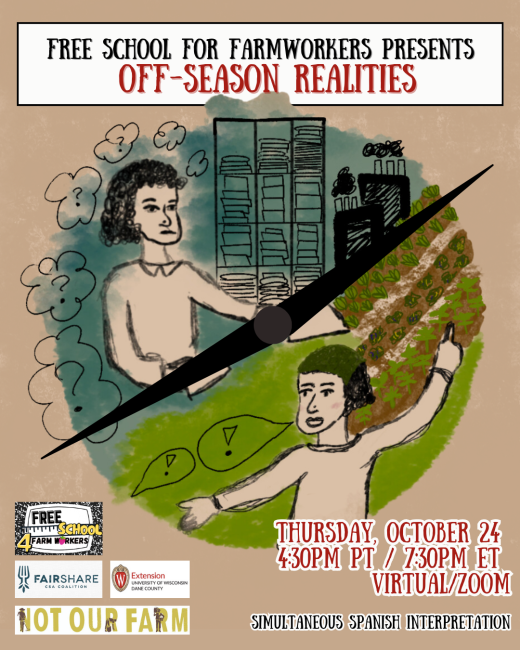
Off-season Realities
Many farms are seasonal or go down to a skeleton crew during the off-season, which means many farmworkers face the annual uncertainty of how to get by until farms are hiring again in the spring. At this teach-in, Kelsey Abad – facilitator and former farmer – led attendees through an asset mapping exercise to identify individual interests and strengths, which fed into strategies for finding off-season work as well as bigger picture discussions around short and long-term sustainability within farmworking.
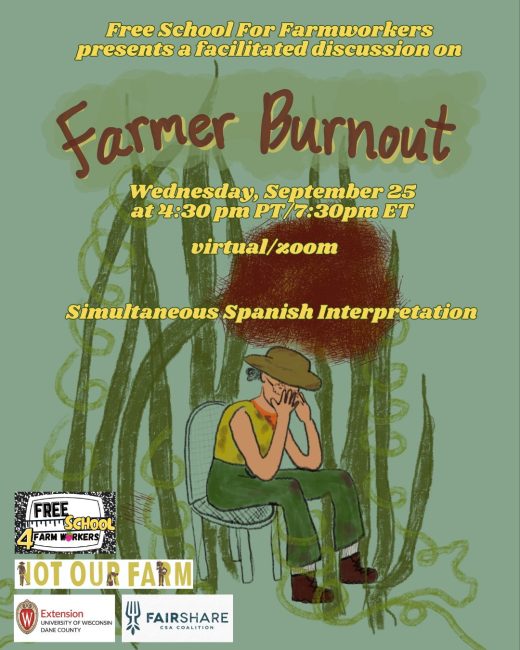
Farmworker Burnout
Burnout can make farmworkers question whether they made the right career choice and can numb them to some of the joys that brought them to farming in the first place. At this teach-in, Laura Fredrickson-Gosewisch – farmer, bodyworker and farmer mental health advocate – led a discussion around the many challenges farmworkers face during the intense summer months. From heavy workloads and long hours to fatigue and the struggles of just scraping by, attendees explored the physical and mental aspects of burnout and considered strategies for recognizing and managing these challenges. We also heard from farmworkers Liz Wang and Kelly Skillingstead who spoke about their own experiences with navigating burnout.
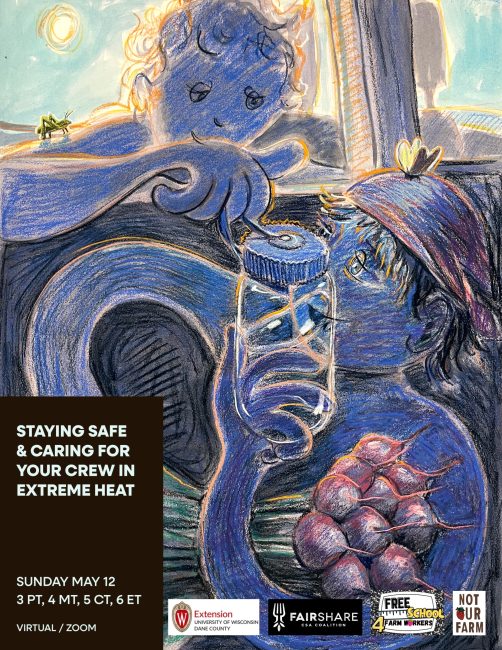
Staying Safe and Caring for Your Crew in Extreme Heat
For farmworkers laboring in extreme heat, staying safe is a growing challenge – especially without federal heat protections in place. Building knowledge and awareness can help prepare workers to care for themselves and their fellow crew members while working in extreme temperatures. At this teach-in, Maxfield Estela with No More Deaths/No Más Muertes and Yessica Martínez with Colorado State University’s High Plains Intermountain Center for Agricultural Health and Safety taught attendees about hydration, how to recognize heat-related illnesses, and emergency procedures for providing immediate care until professional help arrives. Farmworkers Alex Hagiepetros and Skot Colacicco shared their own experiences with how farm environments can promote safety in extreme weather through thoughtful and practical actions and policies.
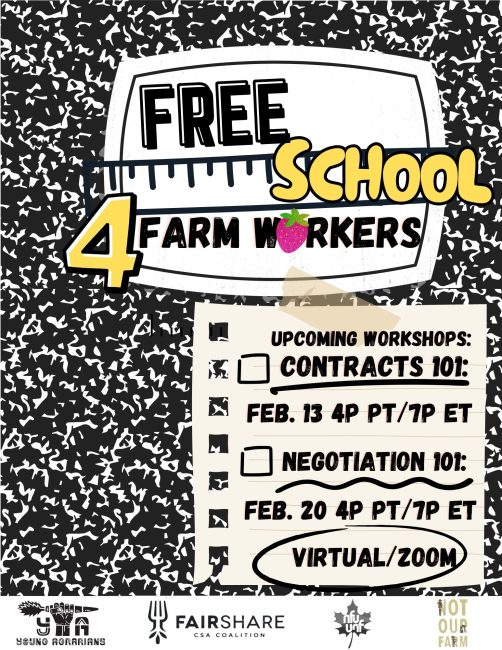
Employment Contracts and Negotiating 101
In its inaugural offering, this two-part Free School teach-in explored opportunities to bring more stability and security into the field of farmworking. Lawyer Alexia Kulwiec with the School for Workers outlined what qualifies as an employment contract and what purpose these documents can play in the farming landscape. Building on this, Sheila Ciminera with To Bear Witness Therapy and Kit Andres with Migrant Workers Alliance for Change introduced common techniques farmworkers can use when negotiating – whether as part of a formal contract or for other benefits like a pay raise or a new title. Because negotiating often means being in a highly vulnerable position, this teach-in also emphasized self-care and collective action.

